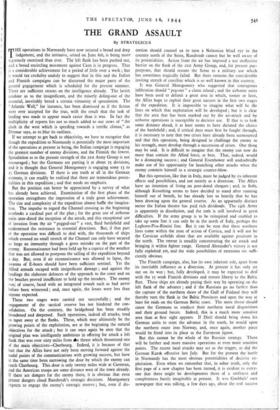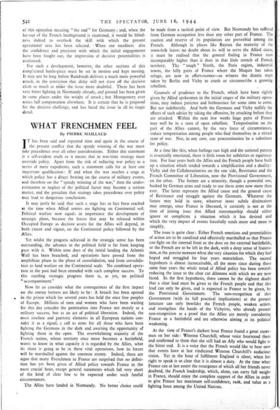THE GRAND ASSAULT
By STRATEGICUS
THE operations in Normandy have now secured a broad and deep lodgement, and the initiative, seized on June 6th, is being more vigorously exercised than ever. The left flank has been pushed out, and a broad encircling movement against Caen is in progress. That is a considerable achievement for a period of little over a week ; but it would tax credulity unduly to suggest that'in this and the Italian and Finnish campaigns can be discerned the major parts of the general engagement which is scheduled for the present summer. There are sufficient strains on the intelligence already. The lavish candour as to the insignificant, and the miserly doling-out of the essential, inevitably breed a certain virtuosity of speculation. The "Atlantic Wall," for instance, has been dismissed as if the fiction were ever accepted for the true, with the result that the task of landing was made to appear much easier than it was. In fact the multiplicity of reports has not so much added to our news of " the clash in the west which is speeding towards a terrific climax," as Dittmar says, as tojalur its outlines.
If we attempt to get back to objectivity, we have to recognise that though the expedition to Normandy is potentially the most important of the operations at present in being, the Italian campaign is engaging the greatest number of enemy divisions, and the Finnish the fewest. Speculation as to the present strength of the 21st Army Group is not encouraged ; but the Germans are putting it at about 25 divisions, and it is thought that General Montgomery is engaging some 13 to 15 German divisions. If there is any truth at all in the German estimate, it can readily be realised that there are tremendous poten- tialities in this expedition ; and that needs no emphasis.
But the position can better be appreciated by a survey of what has already been achieved. Examination of the first phase of the operation strengthens the impression of a truly great achievement. The size and complexity of the expedition almost baffle the imagina- tion. The impulse to regard the Channel crossing as the beginning overlooks a cardinal part of the plan ; for the great use of airborne units ante-dated the inception of the attack, and this exceptional use of invasion from the air " pegged-out" a vast, fluid battlefield and undermined the resistance in essential directions. But, if that part of the operation was difficult to deal with, the thousands of ships which crossed no small stretch of the Channel can only have secured so large an immunity through a gross mistake on the part of the enemy. Reconnaissance had been held up by a caprice of the weather that was not allowed to postpone the sailing of the expedition beyond a day. But, even if air reconnaissance was allowed to lapse, the swarms of E-boats should have been sufficient sentinel. Yet the Allied armada escaped with insignificant damage ; and against the landings the elaborate defences of the approach to the coast and on the beaches proved insufficient to hold up the invaders. The enemy was of course, faced with an integrated assault such as had never before been witnessed ; and, once again, the losses were less than anyone expected.
These two stages were carried out successfully ; and the engagement of the tactical reserve has not hindered the con- solidation. On the contrary, the bridgehead has been steadily broadened and deepened. Such operatiOns, indeed all attacks, tend :o taper away at the flanks. These, which may ultimately be the growing points of the exploitation, are at the beginning the natural objectives for the attack ; but it can once again be sten that the original plan was intelligently ambitious in offering for attack a left flank that was over sixty miles from ale thrust which threatened one of the main objectives—Cherbourg. Indeed, it is because of that bait that the Allies have not only been moving forward against the nodal points of the communications with growing success, but have at the same time been narrowing the door by which the enemy can reach Cherbourg. This door is only twenty miles wide at Carentan, and the American troops are some distance west of the town already. If there are dangers for the enemy there, it is obvious that even greater dangers cloud Rundstedt's strategic decisions. Montgomery expects to engage the enemy's strategic reserve ; but, even if dis- cretion should counsel us to turn a Nelsonian blind eve to the country north of the Seine, Rundstedt cannot but be well aware of its potentialities. Action from the air has imposed a not ineffective barrier on the flank of the 21st Army Group, and, for present pur- purposes, that should restore the Seine to a military use which has sometimes tragically failed. But there remains the considerable inviting stretch of coastline which is so well known in this country.
It was General Montgomery who suggested that courageous infiltration should " peg-out " a claim inland ; and the airborne units have been used to delimit a great area in which, sooner or later, the Allies hope to exploit their great success in the first two stages of the expedition. It is impossible to imagine what will be the lines on which that exploitation will be developed ; but it is clear that the area that has been marked out by the air-attack and by airborne operations is susceptible to decisive use. If that is to look some distance ahead, it at least seems to have dictated the choice of the battlefield ; and, if critical days must first be fought through, it is necessary to note that two crises have already been surmounted and that this operation, being designed to challenge the enemy in his strength, must develop through a succession of crises. One thing may be said. It is difficult to imagine that the enemy can now do more than contain the Allied force, at best. That, indeed, would be a dismaying success ; and General Eisenhower will undoubtedly make use of his opportunity for launching other attacks when the enemy commits himself to a strategic counter-blow.
But this operation, like that in Italy, must be judged by its inherent effects and possibilities, and not merely as a diversion. The Allies have no intention of living on post-dated cheques ; and, in Italy, although Kesselring seems to have decided to stand after running himself out of breath, he has already lost so heavily that he has been drawing upon the general reserve. As an apparently distinct sector the Italian theatre has paid rich dividends. The 14th Army is apparently in dissolution, and the loth is still involved in great. difficulties. If the army group is to be reinspired and enabled to take up some line it can only be in the north of Italy, perhaps the Leghorn-Pisa-Rimini line. But it can be seen that these northern lines come within the zone of action of Corsica, and it will not be the Corsican airfields alone that are available against positions in the north. The retreat is steadily concentrating the air attack and bringing it within fighter range. General Alexander's victory is not fully exploited yet, and the wide possibilities of extension arc suffi- ciently obvious.
The Finnish campaign, also, has its own inherent role, apart from its inevitable influence as a diversion. At present it has only set out on its way ; but, fully developed, it may be expected to deal with the 15 weak Finnish divisions and restore liberty to the Baltic fleet. These ships are already paying their way by operating on the left flank of the advance ; and if the Russians go no farther than the capture of the northern shore of the Gulf of Finland they will thereby turn the flank in the Baltic Provinces and open the way at least for raids on the German Baltic coast. The mere threat should cause the Germans to readjust their northern naval dispositions and their ground forces. Indeed, this is a much more sensitive area than at first sight appears. If Died should bring down his German units to stem the advance in the south, he would open the northern route into Norway, and, once again, another piece would be fitted into its place in the European jigsaw.
But this cannot be the whole of the Russian strategy. There will be further and more massive operations at even more sensitive points. The recent local attacks may act as the trigger, as did the German Kursk offensive last July. But for the present the battle in Normandy has the most obvious potentialities of decisive ex- ploitation. Even when we remember that, in sober truth, only the first page of a new chapter has been turned, it is evident to every- one that there might be developments there of a swiftness and completeness ,barely imaginable at present. It was Goebbels' own newspaper that was talking, a few days ago, about the real success
of this operation meaning " the end " for Germany ; and, when the lay-out of the French battleground is examined, it would be blind- ness indeed to overlook the skill with which the present operational area has been selected. • When one recollects also the confidence and precision with which the initial engagements have been fought out, the impression of decisive potentialities is reinforced.
For such a development, however, the other sections of this comp:icated battle-piece must be set in motion and kept moving. It may not be long before Rundstedt delivers a much more powerful attack, in the conviction that delay will not stave off the decisive clash so much as Make the issue more doubtful. There has been very bitter fighting in Normandy already, and ground has been given in some places under the weight of attack ; but Montgomery ever seizes full compensation elsewhere. It is certain that he is prepared fOr the decisive challenge, and has faced the issue in all its tragic detail.



























 Previous page
Previous page